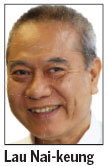'Occupy' conspiracy unveiled
Updated: 2013-07-23 07:23
By Lau Nai-keung(China Daily)
|
|||||||

In essence, a conspiracy theory is nothing but an explanatory proposition that accuses two or more people, a group or an organization of having caused or covered up, through deliberate collusion, an event or phenomenon of great social, political, or economic impact. Originally a neutral term, conspiracy theory has acquired a somewhat derogatory meaning since the mid-1960s, implying a paranoid tendency to see the influence of some malign covert agency in events. After all, it is a simple factual question: there either is a conspiracy or there isn't.
If bad people can collude to fix prices, they can also conspire in other areas on a bigger scale. However, a grand conspiracy is notoriously difficult to prove. People behind it are so smart and resourceful that they seldom get caught red-handed. Adding to that the fact that our society tends to give the benefit of the doubt to the rich and powerful (but not the government), most conspiracy theories out there are simply not convincing enough.
Luckily, proof of a grand conspiracy sometimes come to us when we least expect it, as in the case where a story in the Hong Kong Economic Journal revealed how "Occupy Central" organizers have been lying to us all along.
The story is a strange one in both form and content. Published on July 20, it is written in the style of an interview, but does not make explicit where and when (or, if) the interview is conducted. This is a dirty journalistic trick that is increasingly being employed, for a story requires neutrality and fact-checking, but an interview does not.
The two "interviewees" were Ivan Choy Chi-keung and Chan Kin-man, members of the Alliance for Universal Suffrage. They complained that the central government's promise to hold regular consultation sessions with them never materialized. In response they are organizing "Occupy".
A little history is in order: In June 2010, the central government accepted the reformed proposal suggested by the Democratic Party after consulting with the Democratic Party and the Alliance for Universal Suffrage. The consultation session that the Liaison Office of the Central People's Government in the HKSAR held with moderate dissidents was criticized by some as a "closed-door meeting" and the final proposal was fiercely attacked by radical dissidents.
Representatives of the central government might or might not have given Choy and Chan a "promise", but the point worth noting is that what these scholars now want, despite all appearances, seems to be nothing but more consultation. According to the interview, Choy is even nostalgic for the Basic Law Consultative Committee in the 1980s.
Perhaps this explains why the dissidents like lunches and dinners with officials so much, and why no radical showmanship was executed during the one with Zhang Xiaoming last week. If "Long Hair" Leung Kwok-hung and his radical friends dare to throw things at CY Leung, then why not Zhang as well?
It doesn't take a political scientist to remind them that a consultation is, by definition, not binding. It would be the strangest thing in the world to go to such trouble to occupy Central - to break the law, and be jailed - just for the opportunity to participate in a consultative committee. No. If I occupy Central, I will make sure that substantive results are achieved, and I am sure all sane people think that way.
We can safely conclude that the dissidents' recent sincerity and amity are nothing but a smoke screen, and behind it we can already smell a rat. Here is why.
Benny Tai Yiu-ting's name is not mentioned even once in this piece from the Hong Kong Economic Journal (which is supportive of "Occupy Central"). Chan reveals that he initiated "Occupy" out of impatience, and that the campaign is an extension to the "no talking with middle-man from Beijing" approach that the scholars have adopted since last fall. This suggests that "Occupy" is a collaborative effort right from the beginning, but people involved collude to give us an impression that a "simple-minded" legal scholar conceived the idea alone.
The Basic Law Consultative Committee experience has never been recognized as good, let alone effective, within the dissidents' circle. In saying that what they would like is a mechanism for regular consultation, they are either lying to the central government, or to the people, or both.
The author is a member of the Commission on Strategic Development.
(China Daily 07/23/2013 page1)